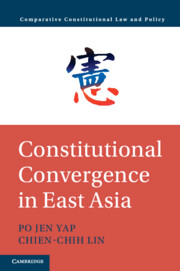Book contents
- Constitutional Convergence in East Asia
- Comparative Constitutional Law and Policy
- Constitutional Convergence in East Asia
- Copyright page
- Contents
- Foreword
- Acknowledgements
- Abbreviations
- 1 Introduction
- 2 Reasons for Convergence
- 3 Convergence on Structured Proportionality
- 4 Convergence on Innovative Constitutional Remedies
- 5 Limits on Convergence
- 6 Conclusion
- Bibliography
- Index
6 - Conclusion
Published online by Cambridge University Press: 18 November 2021
- Constitutional Convergence in East Asia
- Comparative Constitutional Law and Policy
- Constitutional Convergence in East Asia
- Copyright page
- Contents
- Foreword
- Acknowledgements
- Abbreviations
- 1 Introduction
- 2 Reasons for Convergence
- 3 Convergence on Structured Proportionality
- 4 Convergence on Innovative Constitutional Remedies
- 5 Limits on Convergence
- 6 Conclusion
- Bibliography
- Index
Summary
Courts are political institutions. And judges do not operate in an institutional or ideological vacuum, as they are shaped by the social, political, and economic struggles that take place within their political systems. Where the strategic environment confers discretion on the courts, the judges can construct a constitutional identity for their jurisdiction distinct from their government’s vision and redefine the polity’s place in the world. And this constitutional convergence in East Asia will endure so long as the political system in each jurisdiction remains fragmented, the courts continue to be independent and judges choose to align their local jurisprudence with Western human rights law.
Keywords
Information
- Type
- Chapter
- Information
- Constitutional Convergence in East Asia , pp. 172 - 178Publisher: Cambridge University PressPrint publication year: 2021
